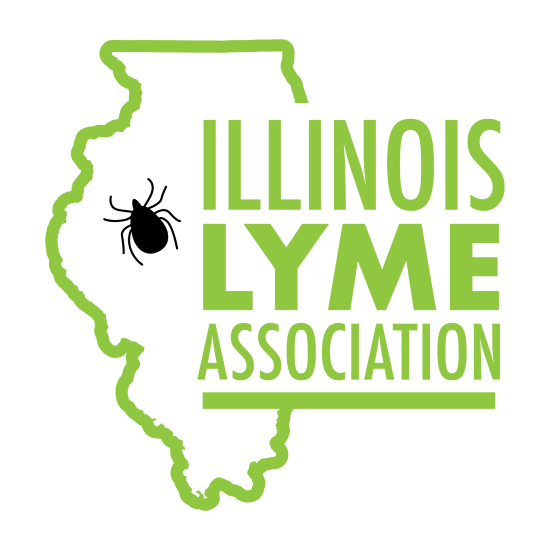Lyme Disease & Mental Health — What You Should Know
By Illinois Lyme Assoication
Each year, approximately 476,000 people contract Lyme disease from the bite of an infected tick, according to the Centers for Disease Control and Prevention (CDC). Lyme disease is the most common vector-borne infectious disease in the United States.
Despite the increasing prevalence of Lyme and other tick-borne diseases throughout Illinois and the country, many healthcare providers are unaware of the changes the illness can have on multiple systems of the body. The central nervous system (CNS) is one such system that may be heavily impacted by Lyme disease, leading to a condition known as neurological Lyme or Lyme neuroborreliosis (LNB).
“It is time to move beyond thinking of Lyme disease as a simple illness that only causes a rash,” says Brian Fallon, MD, MPH, a psychiatrist and researcher with the New York State Psychiatric Institute and Columbia University, in an interview with the Columbia University Department of Psychiatry. “In addition to the risk of severe cardiac, rheumatologic, and neurologic problems, Lyme disease can cause severe mental health problems as well.”
Lyme Disease, Mental Health, and Emerging Research
Below are three areas of emerging Lyme disease and mental health research:
1. Prevalence of LNB
LNB may develop in up to 15% of untreated patients, according to one study in the Journal of Neuroinflammation. Researchers suspect that when Borrelia burgdorferi, the primary species of borrelia causing Lyme in the U.S., enters the CNS, it increases inflammation by way of pro-inflammatory chemicals, IL-6, IL-12, IL-18, and others. Other studies suggest the prevalence of neurological Lyme in patients may be as high as 40%.
2. Mental Disorders and LNB
Research in the American Journal of Psychiatry reported that patients who received a hospital diagnosis of Lyme disease, including in-patient, out-patient, and emergency room visits, had a 28% higher rate of mental disorders, and they were twice as likely to have attempted suicide after infection compared to people without a Lyme diagnosis. Those with the tick-borne disease also had higher rates of affective disorders (depression, bipolar disorder) at 42% and had a 75% higher rate of death by suicide than individuals without a Lyme diagnosis. Contracting Lyme more than once was also associated with higher rates of mental disorders, affective disorders, and suicide attempts.
3. Tick-Borne Illness and Children’s Mental Health
A 2017 retrospective study examined the connection between tick-borne illness (TBI) and pediatric bipolar disorder (PBD) in 27 youths from a Northeastern psychiatric private practice. Testing was conducted for several tick-borne pathogens, including Borrelia burgdorferi, babesia, bartonella, Mycoplasma pneumoniae, anaplasma, and ehrlichia. The study findings indicate 89% of patients tested positive for exposure to one or more pathogens. Of the 27, 16 were found to have babesia, 11 had Mycoplasma pneumoniae, eight were positive for bartonella, and six had Lyme. Researchers suggest there may be a connection between Lyme, other tick-borne diseases, and children’s mental health, especially in treatment-resistant cases.
Symptoms of Lyme Disease
The initial symptoms of Lyme disease and other tick-borne diseases may be general, flu-like in nature, and similar to other diseases, which may lead to the tick-borne disease being undiagnosed or misdiagnosed. Symptoms include:
Fatigue
Fever
Chills
Headaches
Cognitive impairments
Muscle and joint pain
Neck pain
Facial paralysis (Bell’s palsy)
Flu-like feeling
Bulls-eye rash (erythema migrans or EM rash). Note: the bulls-eye rash commonly associated with Lyme disease occurs in less than half of all Lyme infections.
Additionally, some people will develop cardiac, neurologic, and psychiatric symptoms. Mental health conditions such as anxiety, depression, suicidal thoughts, sleep issues, and more may be linked to Lyme and other tick-borne diseases. Early testing may not show an infection, as it could take up to six weeks to develop enough antibodies to be detected on a test.
Key Takeaway
The number of people who develop new-onset mental health issues after a Lyme disease diagnosis is unknown. However, in the interview with the Columbia University Department of Psychiatry, Michael Benros, MD, PhD, principal investigator, and psychiatric epidemiologist at the Research Centre for Mental Health in Copenhagen, Denmark, states, “Treating clinicians and patients should be aware of an increased risk of mental health problems, particularly during the first year after a severe Lyme disease infection, and if mental health issues arise, patients should seek treatment and guidance.”
If you would like a printable version of this information, download our Lyme Disease & Mental Health: What You Should Know Factsheet here.
References
Fallon BA, Madsen T, Erlangsen A, Benros ME. Lyme Borreliosis and Associations With Mental Disorders and Suicidal Behavior: A Nationwide Danish Cohort Study. Am J Psychiatry. 2021 Oct 1;178(10):921-931. doi: 10.1176/ appi.ajp.2021.2009134
Greenberg R. Infections and Childhood Psychiatric Disorders: Tick-Borne Illness and Bipolar Disorder in Youth. Bipolar Disorder: Open Access. 2017 Jan; 3. doi: 10.4172/2472-1077.1000113
How Many People Get Lyme Disease? The Centers for Disease Control and Prevention website. www.cdc.gov/lyme/stats/humancases.html
Lyme Disease Heightens Risk of Mental Health Disorders, Suicidality. Columbia University Department of Psychiatry website. https://www.columbiapsychiatry. org/news/lyme-disease-heightens-risk-mental-disorders-suicidality
Martinez AN, Ramesh G, Jacobs MB, Philipp MT. Antagonist of the neurokinin-1 receptor curbs neuroinflammation in ex vivo and in vitro models of Lyme neuroborreliosis. J Neuroinflammation. 2015 Dec 30;12:243. doi: 10.1186/ s12974-015-0453-y
Teodoro T, Oliveira R, Afonso P. Atypical Lyme Neuroborreliosis, Guillain-Barré Syndrome or Conversion Disorder: Differential Diagnosis of Unusual Neurological Presentations. Case Rep Neurol. 2019 Apr 30;11(1):142-147. doi: 10.1159/000499901
